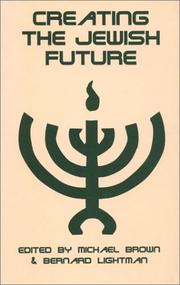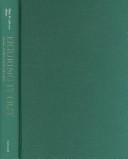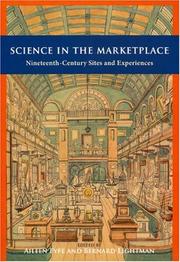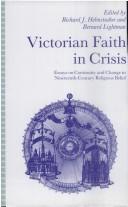Book
ISBN: 9781118620762 9781118620779 9781119121145 9781118620748 9781118620755 Year: 2020 Publisher: Chichester : Wiley-Blackwell,
Abstract | Keywords | Export | Availability | Bookmark
 Loading...
Loading...Choose an application
- Reference Manager
- EndNote
- RefWorks (Direct export to RefWorks)
"Over the last thirty-five years, the study of the history of science has undergone a shift in historiographical approach. While scholars previously focused on the history of abstract scientific discoveries by key figures like Galileo and Newton, contemporary science historians are turning to focus on richer, more descriptive studies within specific and local contexts. A Companion to the History of Science captures this move away from abstract theories and into more intimate analysis of science in its cultural, political, and social contexts. It aims to survey recent developments that have resulted from the effort to re-envision the field. The volume includes forty original essays written by experts in the field, structured around four analytical categories: the roles, places and spaces, communication, and tools of science. Contributors cut across traditional chronological and geographical boundaries to provide thematic analysis of these topics, including discussion of both Western and non-Western themes throughout the volume. These critical essays synthesize the major debates and issues that dominate current scholarly discussion, and point the way for future inquiry"--
Science --- Historiography --- Historiography.
Book
ISBN: 0333496604 Year: 1990 Publisher: Houndmills Macmillan
Abstract | Keywords | Export | Availability | Bookmark
 Loading...
Loading...Choose an application
- Reference Manager
- EndNote
- RefWorks (Direct export to RefWorks)

ISBN: 076199033X 0761990321 Year: 1999 Publisher: Walnut Creek London New Delhi AltaMira Press Sage publications
Abstract | Keywords | Export | Availability | Bookmark
 Loading...
Loading...Choose an application
- Reference Manager
- EndNote
- RefWorks (Direct export to RefWorks)
Jews --- Judaism --- Intellectual life --- Congresses. --- Forecasting --- 20th century --- Congresses

ISBN: 1584656026 1584656034 9781584656029 9781584656036 Year: 2006 Publisher: Hanover, N.H. Dartmouth College Press
Abstract | Keywords | Export | Availability | Bookmark
 Loading...
Loading...Choose an application
- Reference Manager
- EndNote
- RefWorks (Direct export to RefWorks)

ISBN: 022615002X 9780226150024 9780226276502 0226276503 Year: 2007 Publisher: Chicago
Abstract | Keywords | Export | Availability | Bookmark
 Loading...
Loading...Choose an application
- Reference Manager
- EndNote
- RefWorks (Direct export to RefWorks)
The nineteenth century was an age of transformation in science, when scientists were rewarded for their startling new discoveries with increased social status and authority. But it was also a time when ordinary people from across the social spectrum were given the opportunity to participate in science, for education, entertainment, or both. In Victorian Britain science could be encountered in myriad forms and in countless locations: in panoramic shows, exhibitions, and galleries; in city museums and country houses; in popular lectures; and even in domestic conversations that revolved around t
Science --- Science museums --- Science centers --- Museums --- Natural science --- Natural sciences --- Science of science --- Sciences --- Social aspects --- History --- Great Britain --- Intellectual life --- 19th century, history, historical, humanities, science, transformation, change, scientists, marketplace, social status, authority, discovery, education, entertainment, victorian period, britain, british, panoramic shows, exhibitions, galleries, museums, lectures, cultural studies, culture, popular sciences, common points of discussion, phrenology, popularity, natural, nature, electricity, anatomy, demonstrations.
Book
ISBN: 1139989987 1316010600 113998537X 1316012840 1139236199 1316006107 1316001601 1316008347 1316003841 1107028426 1316646785 Year: 2014 Publisher: Cambridge : Cambridge University Press,
Abstract | Keywords | Export | Availability | Bookmark
 Loading...
Loading...Choose an application
- Reference Manager
- EndNote
- RefWorks (Direct export to RefWorks)
In this collection of essays from leading scholars, the dynamic interplay between evolution and Victorian culture is explored for the first time, mapping new relationships between the arts and sciences. Rather than focusing simply on evolution and literature or art, this volume brings together essays exploring the impact of evolutionary ideas on a wide range of cultural activities including painting, sculpture, dance, music, fiction, poetry, cinema, architecture, theatre, photography, museums, exhibitions and popular culture. Broad-ranging, rather than narrowly specialized, each chapter provides a brief introduction to key scholarship, a central section exploring original insights drawn from primary source material, and a conclusion offering overarching principles and a projection towards further areas of research. Each chapter covers the work of significant individuals and groups applying evolutionary theory to their particular art, both as theorists and practitioners. This comprehensive examination of topics sheds light on larger and previously unknown Victorian cultural patterns.
Culture --- English literature --- Social evolution --- Cultural evolution --- Cultural transformation --- Culture, Evolution of --- Evolution --- Social change --- Literature, Victorian --- Victorian literature --- Cultural sociology --- Sociology of culture --- Civilization --- Popular culture --- History --- Social aspects --- Arts, Victorian. --- Evolution in literature. --- Victorian arts --- History and criticism. --- Philosophy --- Great Britain
Book
ISBN: 0208020101 Year: 1984 Publisher: Hamden Archon books
Abstract | Keywords | Export | Availability | Bookmark
 Loading...
Loading...Choose an application
- Reference Manager
- EndNote
- RefWorks (Direct export to RefWorks)
Biology --- Evolution --- Geology --- Religion and science --- Biological Evolution --- Religion --- Science --- History --- Bibliography --- Religious aspects --- history

ISBN: 0804716021 Year: 1990 Publisher: Stanford (Calif.): Stanford university press
Abstract | Keywords | Export | Availability | Bookmark
 Loading...
Loading...Choose an application
- Reference Manager
- EndNote
- RefWorks (Direct export to RefWorks)
Book
ISBN: 9780367228422 Year: 2020 Publisher: New York Abingdon Routledge
Abstract | Keywords | Export | Availability | Bookmark
 Loading...
Loading...Choose an application
- Reference Manager
- EndNote
- RefWorks (Direct export to RefWorks)
Current studies in disciplinarity range widely across philosophical and literary contexts, producing heated debate and entrenched divergences. Yet, despite their manifest significance for us today seldom have those studies engaged with the Victorian origins of modern disciplinarity. Victorian Culture and the Origin of Disciplines adds a crucial missing link in that history by asking and answering a series of deceptively simple questions: how did Victorians define a discipline; what factors impinged upon that definition; and how did they respond to disciplinary understanding? Structured around sections on professionalization, university curriculums, society journals, literary genres and interdisciplinarity, Victorian Culture and the Origin of Disciplines addresses the tangled bank of disciplinarity in the arts, humanities, social sciences and natural sciences including musicology, dance, literature, and art history; classics, history, archaeology, and theology; anthropology, psychology; and biology, mathematics and physics. Chapters examine the generative forces driving disciplinary formation, and gauge its success or failure against social, cultural, political, and economic environmental pressures. No other volume has focused specifically on the origin of Victorian disciplines in order to track the birth, death, and growth of the units into which knowledge was divided in this period, and no other volume has placed such a wide array of Victorian disciplines in their cultural context.
Book
ISBN: 9780822947929 0822947927 Year: 2023 Publisher: Pittsburgh University of Pittsburgh Press
Abstract | Keywords | Export | Availability | Bookmark
 Loading...
Loading...Choose an application
- Reference Manager
- EndNote
- RefWorks (Direct export to RefWorks)
Religion and science --- Evolution --- History --- Religious aspects

 Search
Search Feedback
Feedback About UniCat
About UniCat  Help
Help News
News